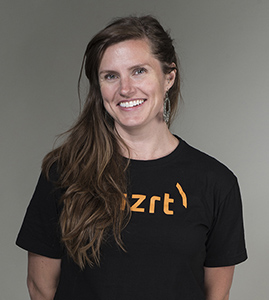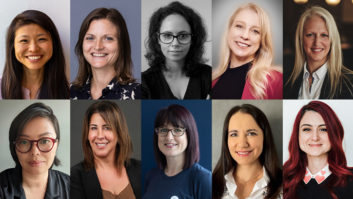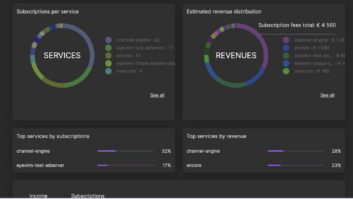In the second of TVBEurope’s series of articles celebrating International Women’s Day 2024, we look at how the media tech industry can encourage more women to enter and stay in it.
From mentoring to educating young women at school or university, or even articles like this, the industry needs to be more vocal about the opportunities available.
We hear from various organisations to find out how we can encourage and promote the women who are part of the media technology industry.
Stacey Wiederhold, VP of human resources, AJA Video Systems
Promoting the incredible work and achievements of women across the industry can be a real motivator for anyone looking to enter the field or pivot career paths. Similarly, ensuring that women across your organisation are visible and active in the community you serve is also important. I personally try to make it out to as many local career fairs as I can, as I often find that candidates are more willing and comfortable to approach a company when they identify with the person they’re speaking to.
Marketing also has a role to play, which is why our team seeks out opportunities to partner with organisations, guilds, events, and publications on initiatives that highlight the accomplishments of women in the field or that are designed to educate and inspire those women getting started or looking to advance their careers.
Daniella Weigner, co-founder and MD of Cinegy

In the media technology sector, we can inspire more women by acknowledging the contributions of female leaders in our field. I’ve seen firsthand how leadership can influence an inclusive, supportive environment. It’s essential to send a clear message: opportunities in this field are not limited by gender. Implementing initiatives like mentorship programs, targeted recruitment drives for women, and policies that support a healthy work-life balance are key steps to encourage more women to join and excel in the media technology industry.
But the real change starts much earlier. For example, in our Ukrainian office, we’ve built strong connections with a local university known for its excellent technical programmes. We’ve successfully recruited many staff from there, including a significant number of women, and have maintained a balanced gender split in technical roles like development, testing, and support.
The shift needs to begin at the school level, with encouragement for all students to engage in STEM subjects from an early age and throughout their academic journey. The industry can contribute by sponsoring local schools and colleges, and offering networking and mentoring opportunities.
Hannah Robinson, production development producer, dock10

Being visible, and being seen is hugely important. We need to encourage more women already working in the industry to showcase themselves. If you see someone like yourself on a panel or on a podcast, then you get the sense that you will belong there too, and you can fight against the imposter syndrome that takes root if you are the only one in the room. There are already some great initiatives out there, such as RISE and the Media Careers Podcast, and we hope to see others join them. We need to shout about women more and encourage women to shout about themselves too. After all, that’s literally what platforms like LinkedIn are for!
Wendy Stanborough, HR director, EMG/Gravity Media
We need to get better at promoting the industry to a wider external market, especially now that we are seeing broadcast technology being increasingly transferred to other verticals. We must also continue to promote media technology to girls in school, and following through into university level, as a great career choice with exciting opportunities, demonstrating that our industry is inclusive. The lifestyle factors for certain production sectors and roles, such as regular travel and unpredictable hours, can be off-putting, but the growth of remote production may make the industry more attractive by providing more structure and stability to job roles.
Amanda Dixon, broadcast marketing manager, MRMC
To inspire more women to enter the industry, concerted efforts are needed at every stage of their educational and professional journeys. By increasing exposure to the opportunities available in the industry from the grassroots level we can help women make informed decisions about their career paths. Encouraging more internships and work placements tailored towards women can offer hands-on experience and mentorship, fostering their confidence and skills, and engaging with universities to encourage more women to pursue engineering and technology-related degrees can also expand the talent pipeline.
Furthermore, promoting collaborations with SMEs can offer women a gateway into the industry towards diverse projects and experiences that may not be achieved at big multinational corporations. Companies should also implement childcare and maternity provisions, as well as offer general flexibility in work arrangements. This can support women in balancing their personal and professional lives, ultimately contributing to a more inclusive media technology sector.
Yaya Selva, global marketing director at Net Insight

I am acutely aware of the need to draw more women into the media technology sector. Inspiring more women to enter and thrive within our field is not just a matter of equity; it’s necessary to foster innovation and diverse perspectives that drive our industry forward.
Scholarships and internships designed explicitly for women pursuing careers in media tech are crucial. These programs can lower the barriers to entry for women and provide them with the educational and practical experiences needed to kickstart their careers. On top of this, hosting events, workshops, and networking opportunities aimed specifically at women, especially those from underrepresented backgrounds, to create spaces where they can connect with peers and mentors. Such environments are key in creating a sense of community, crucial for encouraging women to pursue and persist in careers in media technology.
Media companies must showcase stories and content that elevate women’s voices and perspectives. Representation matters, and by creating and promoting content highlighting women’s achievements and contributions, we can inspire a new generation of women to explore careers in this field.
Leanne Tomlin, marketing director (EMEA), Perifery

The best way to inspire more women into the industry is to showcase the incredible talent we already have. Opportunities need to be highlighted to the younger generation, with more representation from females and those from diverse backgrounds. Young girls need to be aware of the opportunities behind-the-scenes, so rather than dreaming of being the actor, they dream of editing scenes, facilitating live streams, or creating content for the actor. The world of media technology is exciting and creative, and it offers a multitude of roles beyond the spotlight. By encouraging girls to explore technology from an early age, the industry can build a pipeline of future talent from a wealth of perspectives.
In terms of encouraging those of working age to enter the industry, we need, again, to focus on representation. Let’s ensure there is at least one woman on every speaking panel, let’s champion mentorship programs, let’s create more industry-wide events and initiatives, let’s address unconscious biases. It was recently highlighted that only 24% of tech roles are filled by women, so we need everyone in the industry on board to support our efforts. And ultimately ensure the future of media is diverse, inclusive, and reflective of the talents and perspectives of all individuals. The more visibility and representation we as women have, the wider we can cast our net.
Debbie Dey, QA manager, Simplestream

The introduction of women’s solidarity groups like RISE, Women in Streaming Media and Women in Tech are providing a visible and transparent way for women to progress through mentorship, conferences and networking events. When I joined the industry in 2016, there weren’t any organisations like this. Mentorship programmes help women from different backgrounds to be more confident and to support and encourage them to be more vocal and to take up leadership roles.
Female-led internship programmes and work experience also provide opportunities for women to shadow someone within the industry and to understand what’s involved in a working day. Companies also need to promote female role models. I find it inspiring to see C-Suite executive women who are leading the media industry, like Alex Mahon and Reemah Sakaan being promoted on social platforms worldwide.
Claudia Fuentes, chief people officer, Telestream

There are some great initiatives out there already, such as Rise, which is doing a wonderful job driving support for gender diversity across this industry. However, each organisation should also examine their own actions to drive change. This is a process, and progress takes time – but we need to harness the spirit of International Women’s Day and “inspire inclusion” every day.
It starts by broadening where companies look for their talent. They should reevaluate and revamp existing job descriptions to make the language more inclusive. Training is the final key element here. Current teams must understand why DEI is essential and be trained accordingly. Knowledge sharing is the key here; experienced professionals can drive change by mentoring those outside the industry and giving them real insights about what makes media and entertainment technology such an exciting, vibrant, and dynamic environment.
Melanie Crandall, global demand generation manager at Vizrt
It’s a powerful experience to walk into a room full of men and hear a woman speak up. That confidence is an inspiring tool to help other women see that their voice matters, even when we’re the minority in the room. Highlighting the women in positions of power in the industry is a great way to inspire those curious about it – if you can see it, you can be it. It’s important to show women who are in these spaces, asking questions, having their perspectives and voices heard, and making decisions that shape the future of the media tech industry.








